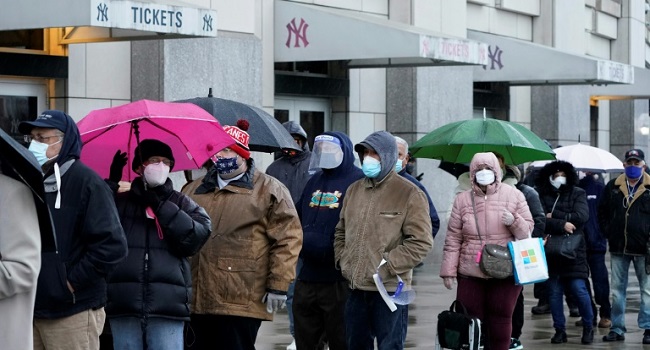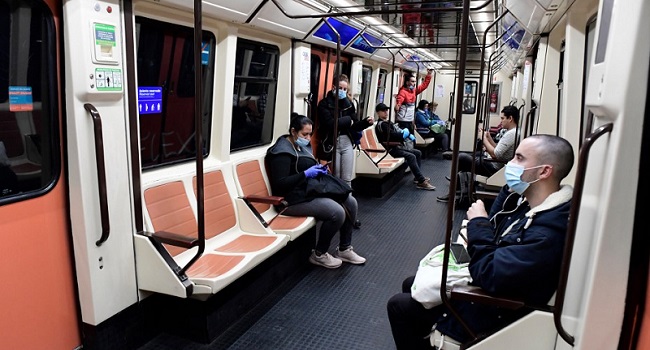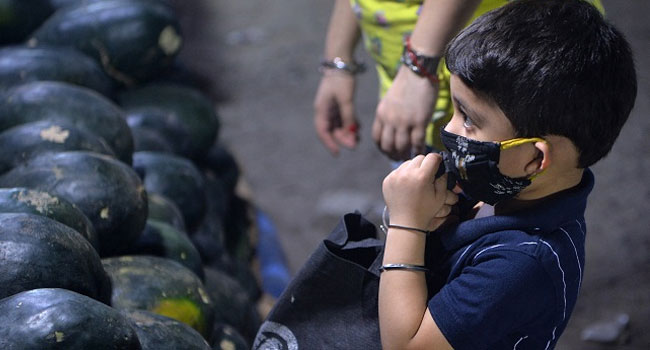
(TIMOTHY A. CLARY/AFP)
Defying the cold and rain, hundreds of people bundled up in thick coats came to get vaccinated Friday in the famous Yankees baseball stadium in the Bronx, a New York borough that has been particularly badly hit by the coronavirus pandemic.
“It’s like a choice between life and death,” said Ines Figueroa, 64, a Puerto Rican resident of the Bronx, after receiving the shot. Her husband died in January of complications linked to the virus which she too contracted, although without developing any symptoms.
The positivity rate in the Bronx is the highest in all of New York’s five boroughs: it was at 6.67 percent Friday, double the rate in the wealthier area of Manhattan, New York governor Andrew Cuomo said.
That is why the authorities in this traditionally Democratic bastion of the city decided to reserve the vaccinations on offer at the stadium exclusively for residents of the Bronx.
– ‘Equity and fairness’ –
Since the start of the pandemic last March, the death rate in New York’s Black and Latino communities has been double that of their white counterparts.
That same racial disparity has played out across the United States, where more than 453,000 people have died of the disease.
Yet these same minorities have until now received fewer vaccinations than other communities.
In New York, figures released on Sunday show that among the 500,000 doses of vaccine already administered, only 15 percent went to Hispanic people, even though they represent 30 percent of the population of eight million. And 11 percent went to African Americans, who make up 25 percent of the population.
“This is about equity. This is about fairness,” said left-leaning Mayor Bill de Blasio at the entrance to the stadium. “This is about protecting people who need the most protection because the Bronx is one of the places that bore the brunt of this crisis of the coronavirus.”
Of the 15,000 appointments on offer in the coming days, some 13,000 have been allocated on Friday.

(TIMOTHY A. CLARY/AFP)
– ‘Troubling’ –
Although in principle the Yankees stadium only offers vaccinations by appointment, many people in line on Friday did not have one. For many, the registration process is not up to scratch, requiring a strong internet connection, a good knowledge of English, and sometimes hours of patience.
After trying in vain for 15 days to get an appointment, Manuel Rosario, 76, managed to get a shot at the stadium on Friday, after standing in line for four hours.
“There should be three more centers like this in the Bronx,” said Rosario, who contracted Covid without symptoms in April. At this rate, “they will have finished vaccinating everyone in two years,” he said.
That relative slowness in rollout due to a shortage of vaccines has been echoed across the country. That is why, to date, only 8.4 percent of Americans have been immunized, according to official data.
“It is deeply troubling that we could be right now doing 400,000, 500,000 vaccinations a week, and we can’t get supply,” said de Blasio.
Distrust of the authorities, a glut of fake news that the vaccine is dangerous, or fear of arrest for undocumented migrants had also contributed to the slow vaccination of minorities, according to experts.
“It has to work out because we are all human beings and we all need the vaccine to survive,” says Manuel Rosario.
Like him, Mercedes Ferreras, a 73-year-old Dominican, came on Friday without an appointment. “I have a computer, but I don’t know how to use it,” she explained.
The same went for Fausto Lopez, 72, who came even though a friend tried to dissuade him, telling him that the vaccine would be a pretext for implanting a chip that would turn him into “a robot”.
“There is too much false information,” said the retired cleaner, who suffers from diabetes, high blood pressure, and has already undergone seven operations.
“The vaccine will change my life,” he said.




